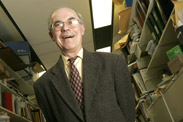History of McGill

McGill's official historian Peter McNally
Owen Egan
McGill has been blessed with not only a rich history, but also able chroniclers whose work has allowed the university to retain a strong collective memory. Peter McNally, author of the third volume of McGill University: For the Advancement of Learning, the university's official history, is looking for people from the university to come forward and share their knowledge. The story will pick up in 1971 and continue to the conclusion of Principal Bernard Shapiro's tenure in 2002.
McNally is donning the mantle of the erudite Stanley Frost, whose two-volume history of McGill remains the definitive story of the university. McNally has been a part of the community since he was an student in the early ‘60s. Now a professor in the Graduate School of Library and Information Studies, McNally occupies an office adorned with royal commemorative memorabilia. The office is also stuffed with books from floor to ceiling, and crammed with mementoes of every description.
As head of the History of McGill Project, a position he took over once Frost finished his 28-year tenure in 2003, McNally is university's official historian. In addition to his contribution to the McGill University series, he writes articles, smaller histories and compiles reference documents such as the McGill Milestones.
McNally is particularly anxious to ensure that sources of the school's history do not leave before he is able to record at least a part of their tales.
"A whole generation of McGill people are now retiring and there's a great deal of memory that's drifting away from the university," he says.
The third volume will encompass many shades of narrative, as McNally intends to use sources from various places in the university. He explains, "Sometimes people will be used because of the posts they occupied, and sometimes because they were interesting, well-placed observers."
The official framework of the book will be the years of the three principals who succeeded Rocke Robertson.
"What I'm looking for are insights of personality and character that will give another point of view - that will show the human side of the public personality. I'm always interested in 'grace under stress' - those who are able to keep calm and exhibit leadership qualities that are needed in being principal."
Although the figures of Principals Robert Bell, David Johnston and Bernard Shapiro will be prominent in the third volume, McNally is clear that the project is not about hagiography. In setting out a period of enormous change for McGill, the school and its people will be presented to show both their strengths and their failings.
The years he is covering were tumultuous ones, and McGill was often directly affected by the same historical tides that washed over Quebec and Canada. The FLQ crisis, for instance, began exactly 24 hours before Principal Bell was inaugurated. The following decades brought numerous other events that directly touched and involved McGill and its people: the election of the PQ in 1976, the creation of Bill 101, the patriation of Canada's Constitution in 1982 and two referendums in 1980 and 1995.
These events also form the backbone of what McNally states will be the major theme of the third volume: the university's place in Quebec. As he carefully points out, the school has not only been affected by changes in the province, but it has also dramatically evolved in response to them. It is no small achievement that McGill has survived a gauntlet of political and social upheavals, and flourished.
"Recall that McGill was once one of many important anglophone institutions in Montreal. It sat alongside insurance companies, banks and so on," says McNally. "Now, in the 2000s, McGill and its satellites are the flagship institutions."
McNally's tale of McGill's ability to prevail in uncertain times will be further enriched by the intellectual debates that took place within the university during this period. Throughout these decades, the school was crackling with its own political currents as sovereigntists and hardline federalists clashed over the school's direction.
McNally is looking forward to individuals coming forward with their stories, and adding to a narrative of McGill that will soon stretch for nearly 200 years. He hopes that volume three will be published in 2009.
For more information, see www.historyofmcgillproject.mcgill.ca.
